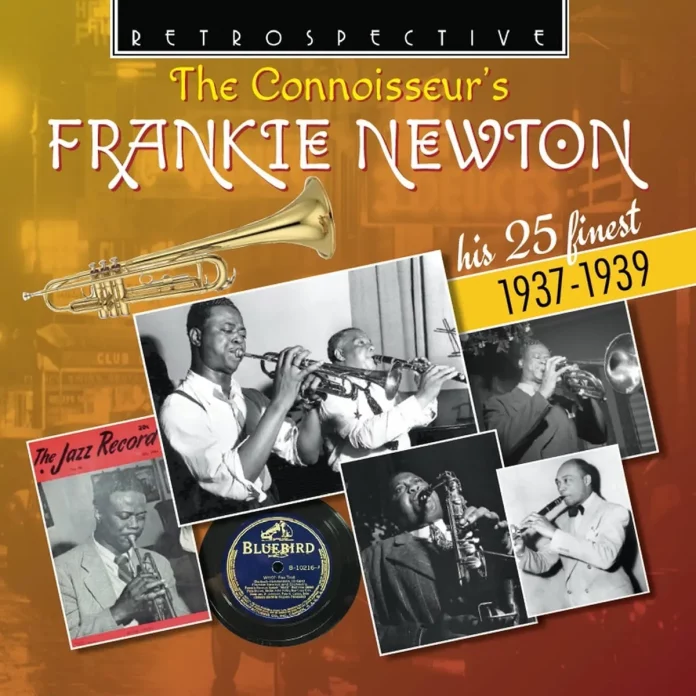Newton was dogged by bouts of ill health and some personal misfortune, and his diverse activity and somewhat diffuse recording legacy brought no major hit records under his own name, which consigned him unjustly to semi-obscurity and a short-lived career. Yet he was an accomplished and adaptable stylist, frequently in demand and admired and respected by fellow musicians. (Ruby Braff acknowledged him as a formative influence.)
He recorded with Bessie Smith in 1933, with Maxine Sullivan in her big hit Loch Lomond in 1937, with Billie Holiday on her famous version of Strange Fruit in 1939, and with many top instrumentalists such as James P Johnson, Ed Hall and Sidney Bechet. The long list of noted band leaders who employed him includes Chick Webb, Teddy Hill, Charlie Barnet, John Kirby and Lucky Millinder.
Rather than an overview of his whole career (which dwindled in the 40s), the narrow window of just 25 tracks recorded over two years (1937-1939) which this selection provides focuses on the peak of his activity and performance as a trumpeter and bandleader, when he was in the limelight for once.
The warmly swinging Uptown Serenaders tracks blend Dixieland with 30s-style swing. Newton leads positively, comfortably supported by a well-organised and talented reed section (Ed Hall, Cecil Scott, Pete Brown or Russell Procope), all soloing convincingly and with style. On the January 1939 tracks, the outstanding rhythm section (Johnson, Casey, Kirby, Cole) generates assured lift, Johnson sparkling in Who?.
Newton’s sensitive and expressive muted solos, an impressive element in his multi-faceted style, stand out in Port Of Harlem Blues, also in The Blues My Baby Gave To Me and the beautiful Minor Jive, both originals by Mezzrow. In contrast he turns to full open horn, with controlled high register phrasing, in After Hour Blues and Blues For Tommy Ladnier. Higginbotham, Bunn and Bechet all contribute memorable solos.
The Café Society Orchestra tracks represent hot 30s swing at its finest, and are beautifully arranged – especially Tab’s Blues, with Tab on soprano. The first-class sax section (Payne, Smith and Hollon) blends tightly and Kenny Kersey shines on piano. Newton sounds buoyant and confident, with hints of Bill Coleman, Buck Clayton and Roy Eldridge.
This is a well-deserved and very enjoyable tribute album honouring a fine and often overlooked musician, whose short career was little favoured by Lady Luck.
Discography
(1) Please Don’t Talk About Me When I’m Gone; You Showed Me The Way; Who’s Sorry now?; I’ve Found A New Baby; There’s No Two Ways About It; The Brittwood Stomp; ’Cause My Baby Says It’s So; Easy Living; (2) Rosetta; Minor Jive; The World Is Waiting For The Sunshine; Who?; The Blues My Baby Gave To Me; Rompin’; (3) Daybreak Blues; (4) Rockin’ The Blues; Port Of Harlem Blues; (5) The Jitters; Tab’s Blues; Frankie’s Jump; (3) After Hours Blues; (5) Jam Fever; (6) Blues For Tommy Ladnier; (5) Vamp; (6) Pounding Heart Blues (79.59)
(1) FN and his Uptown Serenaders. NY, 5 March, 15 April and 13 July 1937. (2) FN and his Orchestra. NY, 13 January 1939. (3) FN and his Quintet. NY, 7 April 1939. (4) The Port Of Harlem Jazzmen. NY, 7 April 1939. (5) FN and His Cafe Society Orchestra. NY, 12 April and 15 August 1939. (6) The Port Of Harlem Seven. NY, 8 June 1939. Newton (t) on all tracks with musicians including Ed Hall, Pete Brown, Russell Procope, Cecil Scott, Mezz Mezzrow, Stanley Payne, Tab Smith, Kenneth Hollon, Sidney Bechet (reeds); J. C. Higginbotham, Dicky Wells (tb); James P. Johnson, Albert Ammons, Meade Lux Lewis, Kenny Kersey (p); Al Casey, Teddy Bunn (g); John Kirby (b); Cozy Cole, Sid Catlett (d); Slim Gaillard (v). Full discography given in the CD booklet, with informative notes by Digby Fairweather.
Retrospective RTR 4391















